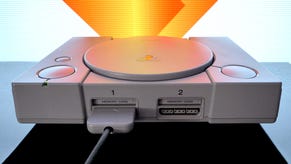Editor's blog: R.U.S.E. interview
Mathieu Girard calls our bluff.
By now you may have seen our hands-on preview of Ubisoft and Eugen Systems' upcoming RUSE, due out for PC, PS3 and Xbox 360 in Q1 2010. If you haven't, the following will probably make no sense whatsoever, because it's a fuller transcript of one of our discussions with project coordinator Mathieu Girard.
The game came from Eugen Systems but it was just a rough idea, and then we discussed design with our teams and brought the vision together, and actually some of the design elements came along as we created the game. For instance, we didn't know there were going to be deception skills working in sectors - we wanted to be able to manipulate, to fool your opponent, but we really didn't know how it would happen in the game, so some of the ideas matured along the project.
The setting itself, World War II, it's a very good example of lots of use of espionage - breaking codes, the Ultra machine, the Enigma, or Japanese bombers attacking Pearl Harbor under radio silence, for instance. All of that was the ground to find the ideas, to develop this kind of power, so we used the existing and then went from that to develop some powers which feel realistic. There were decoy units in the war - Rommel used them, the British used them. They had a fake Alexandria Harbor in Egypt with fake flames and stuff like that, which was bombed every night by the Germans, so it was really something that existed and that we took advantage of.
It was just the setting, but I think it was a very good setting to start RUSE, because it's the last historical war on a world scale with all the units we know nowadays - tanks, infantry, aeroplanes, everything - and it's also easier to understand because lots of people know what the weapons are good for. When you do a modern war game, you have to understand about electronics, radar jamming and stuff like that, which is a bit complex. So it's a good setting. Huge battles, balanced strength between the factions - so it really felt like a good spot to start.
I think we're striking the genre from a different angle, because it's more about the table, the battle-plan, strategies facing each other, so it's really like being a general instead of being a captain or a lieutenant on the field. So I think this is... When people start playing they have the briefing on the table, they have the feeling that they manipulate huge armies... I think they're going to feel something different and a new approach to the universe.
Actually one of the big tricks in the development of the AI was to teach it to be fooled by the powers, and how to use them, so it's going to use all 10 powers. It's going to choose them by random. And the AI is divided into sub-commanders - they all talk to each other and decide which global strategy is going to be applied and which ruses need to be applied. So you have to teach the AI that an unknown force of enemy units coming towards it is a danger, so it can divert some forces towards it even though they're your decoys. The AI would actually be able to know that, because it has access to all the memories in the computer, but you have to teach it how to be fooled by the enemy's doing. So it was an element of development.
And also the other part was the micro-AI. When units are damaged, they start to slow and to fire and then to retreat to heal up automatically, so the point is not to micromanage unit damage and repairs - it's to concentrate on groups of armies, what you do and what's your plan.
I really think that for the campaign the experience can be as enjoyable by PC guys and console guys. Maybe the campaign will appeal more to console guys and then the multiplayer itself is going to be a more hardcore PC thing? But anyway, I think we've found some nice middle ground without too many compromises, to have the game being played as much on PC as on console, because again the depth of the game is not reduced by the fact you can play with the pad. Since it's a game about strategy, about huge battle-plans, you don't need micro action or lots of keyboard shortcuts.
Maybe you could call it real strategy [laughs]. In real time.
It's difficult to speak about competitors precisely, but I would say there's been an evolution on trying to achieve something with a strategy game that can be played on a console. I think we've done a huge work on the pad itself with a magnetism system, some snapping to the objectives. There's a wealth of elements in terms of control and camera which are a breakthrough on console, and I think you're going to find you can play a really deep and interesting mission with the pad.
I think some of the guys got inspiration by some of the RTS on console, but from my point of view [the other games] did mostly over-simplify or try to map all the keys of the keyboard on a pad, which is maybe not necessarily best. For instance, the zoom itself [in RUSE] allows you to remove the mini-map, to avoid having different layers of gameplay which you have to switch to.
The way we work with third-party studios is we're not just someone giving a cheque at the end of the month, we get involved and discuss design and the team is working with our teams - playtesting, obviously marketing, but also sound designers and art directors, localisation and so on, so we can really go deep. We can provide them with directors for the cut-scenes, so it's really a tight integration. They're really part of the company, and come often to our offices. Which is quite easy since they're in Paris.







